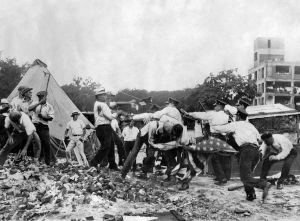
Back Bonus Army German Bonus Army Esperanto Bonus Army French Bonus Army ID ボーナスアーミー Japanese 보너스 아미 Korean Bonus Army Portuguese Армия солдатской надбавки Russian 酬恤金進軍事件 Chinese 卹金之騷 ZH-CLASSICAL
| Bonus Army | |||
|---|---|---|---|
 Bonus Army marchers (left) clash with the police | |||
| Date | July 28, 1932 | ||
| Location | |||
| Caused by | Impoverishment of World War I veterans due to the Great Depression | ||
| Resulted in | Demonstrators dispersed, demands rejected, Herbert Hoover loses 1932 presidential election | ||
| Parties | |||
| |||
| Lead figures | |||
Walter W. Waters | |||
| Number | |||
| |||
| Casualties and losses | |||
| |||
The Bonus Army was a group of 43,000 demonstrators – 17,000 veterans of U.S. involvement in World War I, their families, and affiliated groups – who gathered in Washington, D.C., in mid-1932 to demand early cash redemption of their service bonus certificates. Organizers called the demonstrators the Bonus Expeditionary Force (B.E.F.), to echo the name of World War I's American Expeditionary Forces, while the media referred to them as the "Bonus Army" or "Bonus Marchers". The demonstrators were led by Walter W. Waters, a former sergeant.
Many of the war veterans had been out of work since the beginning of the Great Depression. The World War Adjusted Compensation Act of 1924 had awarded them bonuses in the form of certificates they could not redeem until 1945. Each certificate, issued to a qualified veteran soldier, bore a face value equal to the soldier's promised payment with compound interest. The principal demand of the Bonus Army was the immediate cash payment of their certificates.
On July 28, 1932, U.S. Attorney General William D. Mitchell ordered the veterans removed from all government property. Washington police met with resistance, shot at the protestors, and two veterans were wounded and later died. President Herbert Hoover then ordered the U.S. Army to clear the marchers' campsite. Army Chief of Staff General Douglas MacArthur commanded a contingent of infantry and cavalry, supported by six tanks. The Bonus Army marchers with their wives and children were driven out, and their shelters and belongings burned.
A second, smaller Bonus March in 1933 at the start of the Roosevelt administration was defused in May with an offer of jobs with the Civilian Conservation Corps (CCC) at Fort Hunt, Virginia, which most of the group accepted. Those who chose not to work for the CCC by the May 22 deadline were given transportation home.[2] In 1936, Congress overrode President Roosevelt's veto and paid the veterans their bonus nine years early.
- ^ Cite error: The named reference
timebattlewas invoked but never defined (see the help page). - ^ "'Take Job in the Forest or Go Home' Is Alternative Given to Bonus Boys", Middlesboro (Kentucky) Daily News, May 17, 1933, p. 1; "Bonus Marchers Weaken; Accept Jobs in Ax Corps", Milwaukee Journal, May 20, 1933, p. 1
© MMXXIII Rich X Search. We shall prevail. All rights reserved. Rich X Search